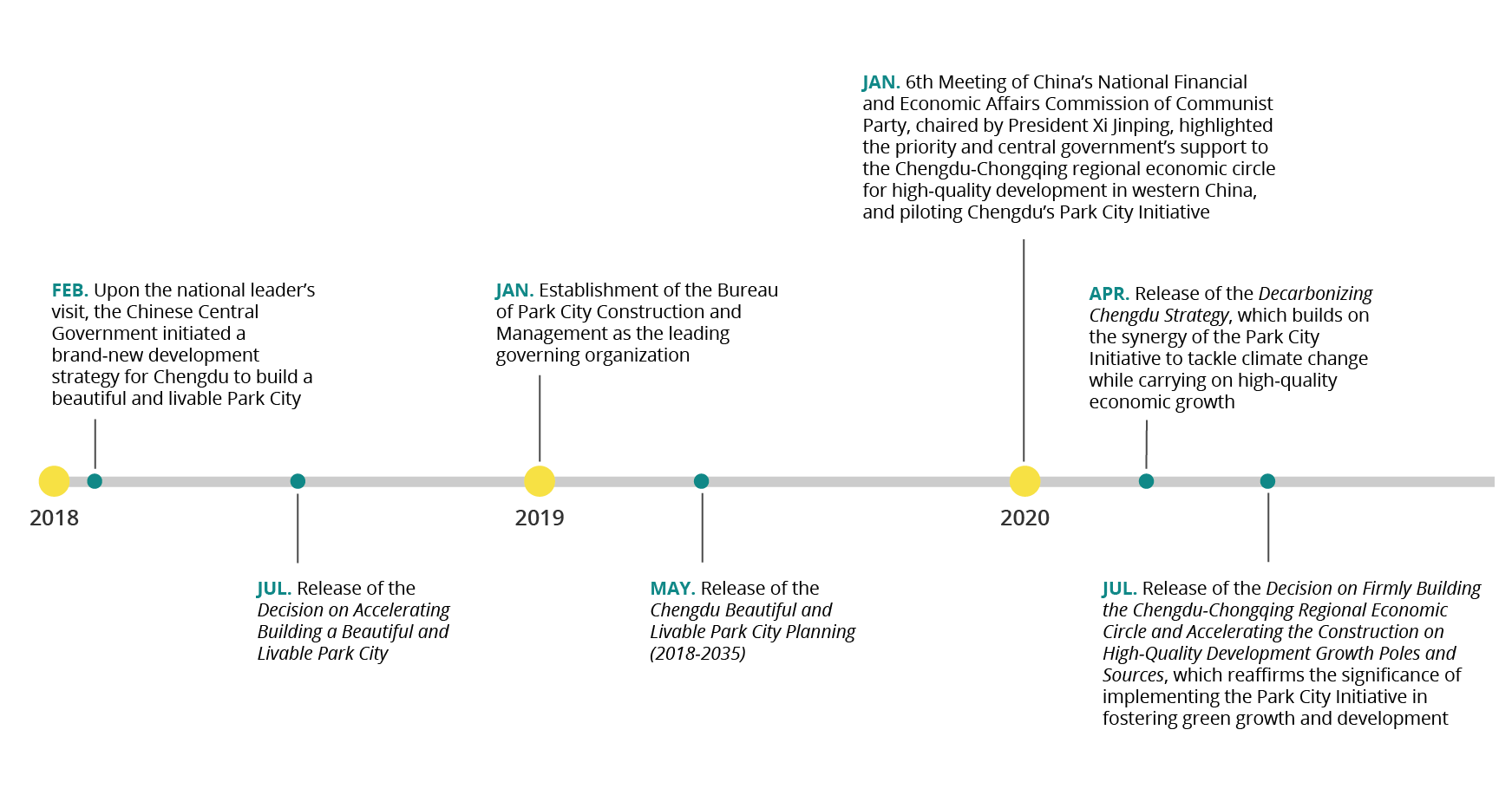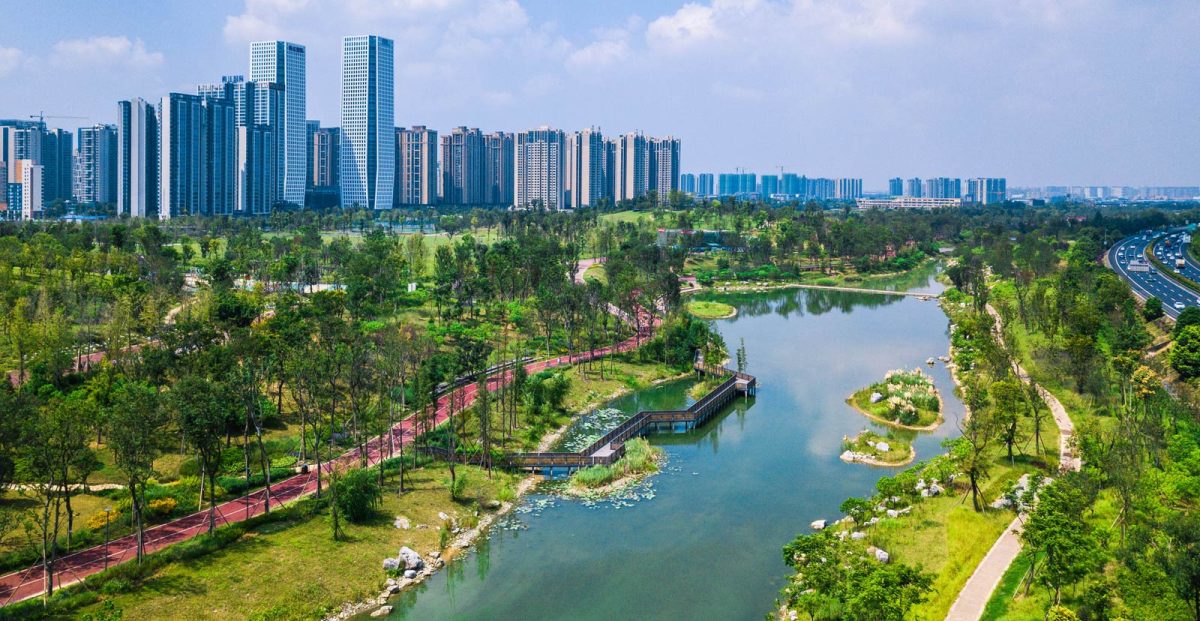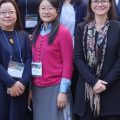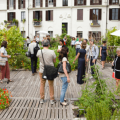Chengdu’s Story: Path towards a Park City

As one of the top economies in the world, China is transitioning from the previous focus of large-scale development and rapid economic growth, to highlighting high-quality growth and sustainability as the new development priorities
More specifically, the 19th National Congress of the Communist Party of China (CPC) reaffirmed the country’s commitment to climate action with greater priority placed on areas including low-carbon economy, air quality, water and waste management, ecological conservation and restoration, and land use. In doing so, the country is also looking to strengthen its regulatory systems and monitoring schemes.
In early 2018, under the background of China’s national priorities, Chengdu, the capital city of Southwestern Chinese province of Sichuan, with a population of 16.58 million and GDP of CNY 1.7 trillion (respectively ranking No.4 and No.7 in the country), was tasked with a brand-new development strategy by the Central Government to ultimately transform itself into a Park City with the world’s largest network of paths for pedestrians and cyclists by 2050.
To achieve the goal, the Chengdu Municipality has released a number of policy documents including theDecision on Accelerating Building a Beautiful and Livable Park City, the Chengdu Beautiful and Livable Park City Planning (2018-2035), and the Decarbonizing Chengdu Strategy which are regarded as the green dimension of the city’s 2016-2035 Urban Development Plan.

Chengdu’s Park City Initiative Development Timeline / Source: ICLEI East Asia
Rather than simply creating green spaces and parks in the urban setting, the idea behind Chengdu’s Park City Initiative is to build a ‘city within a park’, generating a new type of development model based on the Chinese concept ‘ecological civilization’ which highlights the balance between environmental protection and economic growth, as well as improving the living quality of local residents and reshaping the city’s general competence.
Objectives
With the overarching goal of embedding ecological values and environmental protection efforts into urban development, Chengdu’s initiative to build a park city has not only provided a critical turning point for the city to scale up its sustainable development, but has created a new growth pole to open up the landlocked areas for higher quality development in Western China with a new strategy that systematically integrates the harmony among people, living area, environment and nature, and economic development . The four key objectives of Chengdu’s Park City Initiative include:
-
Enhance public awareness and understanding regarding the Park City concept, which is embedded into all aspects of the city’s urban development process;
-
Form a development pattern that supports the harmonious coexistence between nature and mankind;
-
Develop a livable and attractive city for people and industries, where innovative and creative technologies, operations, and models could continue to thrive;
-
Demonstrate the value of urban ecology, and enhance the city’s competencies in the long run.
Strategies
Strategy-wise, Chengdu’s Park City Initiative would not only be an effective solution for urban challenges, but will also look into reshaping and transforming Chengdu in the aspects of urban development model and management, public’s living styles, and governance, by guiding actions that lead to boosts in values regarding:
-
urban beautification – establish a decent image that includes natural ecological patterns and large-scale park city designs;
-
ecological environment – form a harmonious “community with shared future” in the city, coexisting with the natural surroundings;
-
humanity – inherit the city’s history and local culture;
-
economy – strengthen innovation-driven green industries, develop a clean and efficient green resource system, renovate traditional industrial models for rural revitalization, and cultivate new business models and consumption scenarios;
-
quality of living – enhance citizens’ awareness and ownership, optimize the green supply chain of public services, and create a healthy and comfortable living environment.

Chengdu Guixi Ecological Park / Source: Tianfu Greenway
Actions and Progress
In early 2019, the Chengdu Municipality established the Bureau of Park City Construction and Management to lead the planning and development work of the Park City Initiative. As of July 2020, a number of actions and progresses have been made:
1. Utilize innovation the driving force for high-quality development, sustainability, and building a Park City.
-
Initiated the first-ever “urban opportunity list” in China to connect new economy opportunities with the city’s needs, as a means to further stimulate innovative vitality and urban development;
-
Developed plan to establish 66 industrial zones, 14 industrial ecosystems and 10 million square meters of spaces for high-quality development;
-
Accelerated the development of the Science Town in the western part of the city;
-
Reformed the intellectual property system of S&T achievements;
-
Integrated industrial and innovation chains.
2. Reform Chengdu’s spatial planning to foster sustainable development with optimized coordination and high-quality standards.
-
Developed the concrete Chengdu Beautiful and Livable Park City Planning;
-
Optimized the city’s master plan to emphasize the coordination between rural and urban areas, while utilizing the characteristics and strengths of each districts;
-
Prioritized the development of the Chengdu-Chongqing regional economic circle as the new growth pole, and enhanced intra-cities and metropolitan areas collaboration.
3. Highlight green and ecological values as the core of development.
-
Constructed the Tianfu Greenway which extends 4,000 km (final goal is 16,930 km) in the city with connections to hundreds of parks, gardens and protected ecological zones, covering 43.5% of urban areas;
-
Optimized the natural capital accounting and valuation system, launched green land ecological value funds, and channeled revenue captured from real estate, tourism and sports facilities into the management and operation of ecological green spaces;
-
Advocated low-carbon lifestyles and built a green mobility network that integrates railway, bus and slow traffic;
-
Promoted green and low-carbon industrial development to lead the city’s transition, and applied the low-carbon product certification for export.
4. Establish effective governance systems to enhance the city’s resilience.
-
Launched 17 smart systems and applications for different sectors, including transportation, urban management, and environmental protection;
-
Renovated the public service supply chain by initiating a government-led platform where all relevant stakeholders in the market could actively participate;
-
Established urban and rural development committees to enable citizen-centered governance at the community level;
-
Improved incentive mechanisms for volunteers to enhance the ownership and management of social services and governance at the community level.
Chengdu has committed to improve the life quality of residents, ecological protection, green development, and reduction of carbon footprint. Since 2018, the city has made an overall plan for the layouts of industrial production, trying to direct its development towards a high-quality, human-centered, and environmental-friendly path. Through the new Park City Initiative, Chengdu is ready to lead its citizens on the journey to a sustainable future where they can enjoy a better quality of life by living in a city within a park.
At a recent event co-organized by ICLEI and partners, Vice Mayor of Chengdu reaffirmed that in line with the city’s opening-up and win-win principle, Chengdu is willing to build more opportunties for knowledge sharing and peer learning on the Park City Initiative with the cities around the world, to jointly acheive the Sustainable Development Goals.




